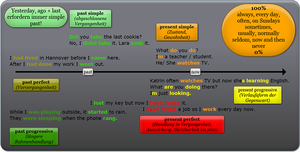Present Perfect/Exercises 1: Unterschied zwischen den Versionen
K (+Vorlage) |
|||
| Zeile 1: | Zeile 1: | ||
{{Achtung|Remember: "''He,she, it" -> "has''", | {{Achtung-en|Remember: "''He,she, it" -> "has''", | ||
otherwise "''have''"!}} | otherwise "''have''"!}} | ||
| Zeile 6: | Zeile 6: | ||
=== have or has? === | === have or has? === | ||
Move the words into the gaps: | |||
<div class="lueckentext-quiz" lang="en"> | <div class="lueckentext-quiz" lang="en"> | ||
"Look! Someone ''has'' left the room in a mess!" | "Look! Someone ''has'' left the room in a mess!" | ||
| Zeile 19: | Zeile 20: | ||
=== has/have or hasn't/haven't? === | === has/have or hasn't/haven't? === | ||
Put in the correct forms: | |||
<div class="lueckentext-quiz" lang="en"> | <div class="lueckentext-quiz" lang="en"> | ||
Becky ''has()'' fed the dogs with dog biscuits. They ''have()'' eaten all of them. | Becky ''has()'' fed the dogs with dog biscuits. They ''have()'' eaten all of them. | ||
| Zeile 111: | Zeile 113: | ||
Want to do more? - [[Englisch/Grammatik/Tenses/Present_Perfect/Übung_2|more exercises]] | Want to do more? - [[Englisch/Grammatik/Tenses/Present_Perfect/Übung_2|more exercises]] | ||
{{Tenses}} | |||
[[Kategorie:Englisch]] | [[Kategorie:Englisch]] | ||
Version vom 16. November 2018, 15:23 Uhr
Remember: "He,she, it" -> "has",
otherwise "have"!
Interactive Exercises
have or has?
Move the words into the gaps:
"Look! Someone has left the room in a mess!"
"Who has been here?"
The dogs have turned the packets upside down. The dog biscuits have fallen out. Mini has eaten most of them but Maxi has played with a ball. The dogs have made a mess!
Mother calls: "Hello dogs, we have brought you a bone! Oh, who has done this mess?"
has/have or hasn't/haven't?
Put in the correct forms:
Becky has() fed the dogs with dog biscuits. They have() eaten all of them.
Maxi and Mini have() played with a ball.
Simon has() read a comic but he hasn't() cleaned the floor yet.
At 11.15 Becky has() helped her mom with the meal. At twelve o`clock they have() eaten lunch.
Becky washed the car but Simon hasn't(not) helped her. He has() gone to David. They have() played football with Mark.
Becky has() fed the dogs with dog biscuits. They have() eaten all of them.
Maxi and Mini have() played with a ball.
Simon has() read a comic but he hasn't() cleaned the floor yet.
At 11.15 Becky has() helped her mom with the meal. At twelve o`clock they have() eaten lunch.
Mr. Burton has() washed the car but Simon hasn't() helped him. He has() gone to David. They have() played football with Mark.
past participles of irregular verbs
Regelmäßige past participles werden mit -ed gebildet. Die unregelmäßigen musst Du auswendig lernen. Du findest sie hinten in deinem Englischbuch!
Beim Klick auf die Ziffern im Kreuzworträtsel öffnet sich ein Eingabefeld zum Eintragen.
Trage die past participles der Verben ein!
| understood | past participle von: understand |
| written | past participle von: write |
| begun | past participle von: begin |
| forgotten | past participle von: forget |
| felt | past participle von: feel |
| thought | past participle von: think |
| meant | past participle von: mean |
| chosen | past participle von: choose |
| bitten | past participle von: bite |
| hidden | past participle von: hide |
| fallen | past participle von: fall |
| left | past participle von: leave |
Want to do more? - more exercises
Past Tense:
Present Tense:




